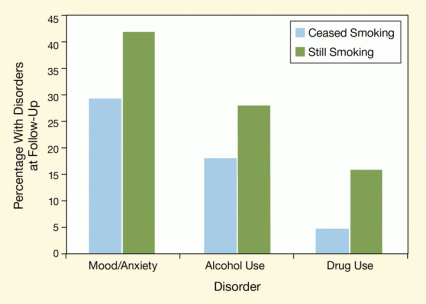Smoking cessation appears unlikely to hinder and may even help recovery from substance use disorders and from mood and anxiety disorders (M/AD). These recent findings should ease concerns that encouraging patients to quit smoking might endanger their success in treatment of these disorders, NIDA-supported researchers say.
Dr. Patricia Cavazos-Rehg at the Washington University School of Medicine in St. Louis, Missouri, and colleagues examined the responses of nearly 5,000 daily smokers who completed the National Epidemiological Survey on Alcohol and Related Conditions (NESARC) in 2001–2002 and a follow-up interview 3 years later. At the first interview, about 24 percent of the participants had a current or past history of a drug use disorder (DUD), 50 percent of an alcohol use disorder (AUD), and 39 percent of an M/AD.
 Figure. Smoking Cessation Is Linked to Reduced Prevalence of Substance Use and Mood/Anxiety Disorders Some survey* participants with current or past histories of the disorders quit smoking during the 3-year period between initial and follow-up interviews. Compared with participants with such histories who continued to smoke at or near their initial intensity, these people who quit were less likely to have current diagnoses of the disorders at the follow-up interview. * NESARC, 2001–2002
Figure. Smoking Cessation Is Linked to Reduced Prevalence of Substance Use and Mood/Anxiety Disorders Some survey* participants with current or past histories of the disorders quit smoking during the 3-year period between initial and follow-up interviews. Compared with participants with such histories who continued to smoke at or near their initial intensity, these people who quit were less likely to have current diagnoses of the disorders at the follow-up interview. * NESARC, 2001–2002
- Text description of the Figure
-
The figure shows a bar graph indicating the prevalence of mood/anxiety disorders, alcohol use disorders, or drug use disorders among study participants who either did or did not stop smoking. The vertical (y)-axis shows the proportion of participants (in percent) with any of these disorders and the horizontal (x)-axis the type of disorder. Light blue bars indicate the percentages of the participants who ceased smoking and green bars the percentages of those who continued to smoke. Among the study participants who stopped smoking, fewer currently had any of the three disorders than among participants who continued to smoke. For participants with a history of mood/anxiety disorders, among those who stopped smoking, 29.4 percent currently had one of these disorders versus 42.1 percent of those who still smoked. For participants with a history of an alcohol use disorder, among those who stopped smoking, 17.9 percent currently had an alcohol use disorder versus 28 percent of those who still smoked. Among participants with a history of drug use disorders, of those who stopped smoking, 4.9 percent currently had a drug use disorder versus 16.0 percent of those who still smoked.
Between the two interviews, nearly 60 percent of the respondents cut back on smoking by 10 percent or more, including 19 percent who quit smoking altogether. Some participants who had reported disorders at the initial interview no longer had them at the follow-up, while others had developed a disorder for the first time. Those who quit smoking during the interval were less likely to have a continuing or recurrent disorder at the follow-up (see Figure).
Compared with those who continued smoking at or near their initial intensity, quitters reported fewer continuing or recurrent DUDs (by 69 percent), AUDs (by 36 percent), and M/ADs (by 30 percent) at the follow-up. The associations between smoking cessation and reduced risk for an AUD or M/AD retained statistical significance when the researchers adjusted their estimates to take into account other factors that might promote or trigger the disorders. Further analysis suggested that quitting smoking reduced the risk for persistent or recurrent DUD partly through an impact on concurrent AUD.
Similarly, people who quit smoking were less likely than steady smokers to develop new-onset DUDs (68 percent less likely), AUDs (21 percent), or M/ADs (24 percent) during the survey period. After adjustment for other potentially influential factors, quitting was still significantly associated with reduced risk for a new-onset DUD but not with lower risks for a new-onset AUD or M/AD.
The researchers note that they cannot say that smoking cessation caused the reductions in risk for mental disorders they observed, because the NESARC does not indicate whether the participants' smoking reductions preceded or followed the changes in the disorders. Nevertheless, the Missouri team's findings are consistent with those of other studies, and strongly argue that smoking cessation is highly compatible with recovery from mental disorders.
This study was supported by NIH grants DA021237, DA025733, DA032843, DA021237, and DA031288.
Source
Cavazos-Rehg, P.A.; Breslau, N.; Hatsukami, D. et al. Smoking cessation is associated with lower rates of mood/anxiety and alcohol use disorders. Psychological Medicine 44(12):2523-2535, 2014. Full text
